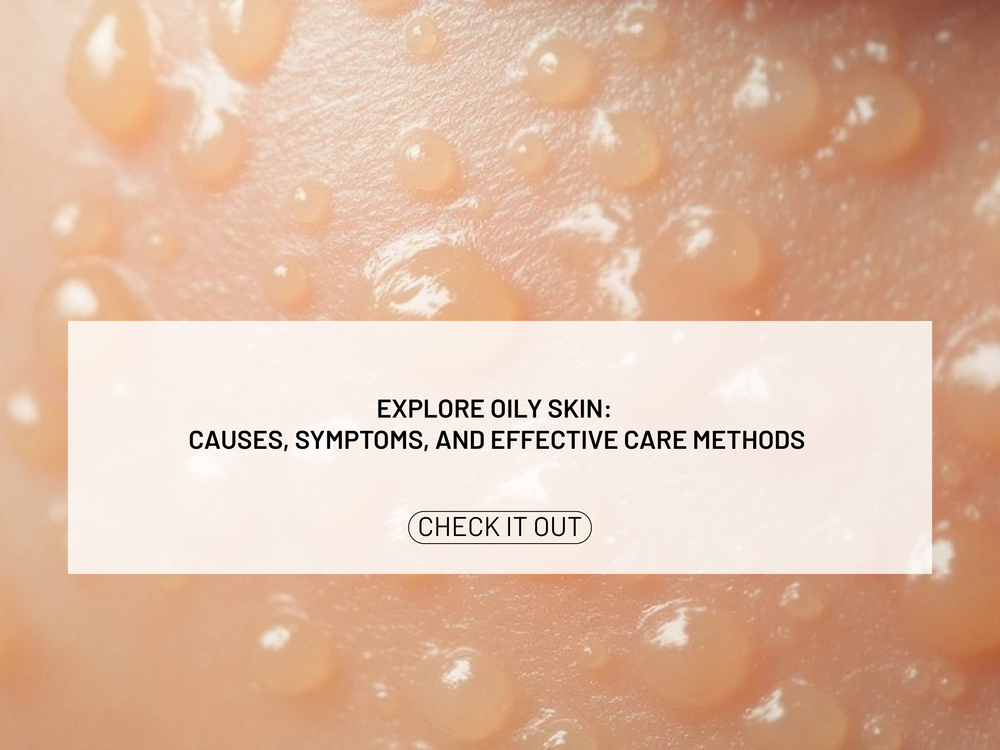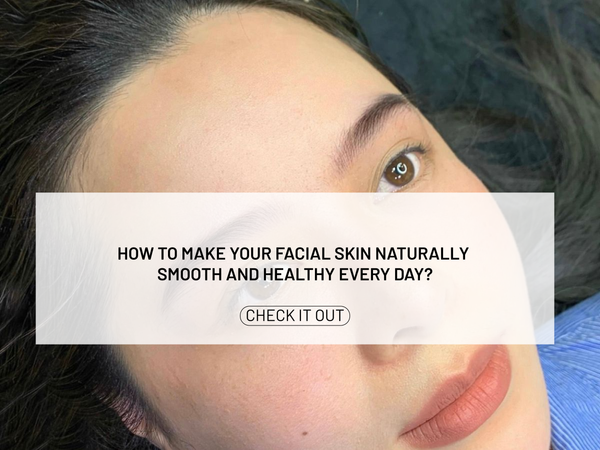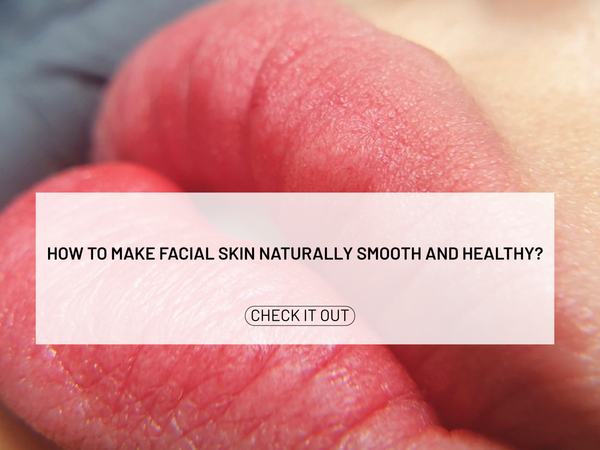Explore Oily Skin: Causes, Symptoms, and Effective Care Methods
Oily skin is one of the most common skin types, often causing many issues such as greasiness, enlarged pores, and acne. This article will help you understand the causes, signs, and effective ways to care for oily skin to achieve healthy and radiant skin.
Summary of Key Points
- Oily skin can be due to genetics, age, and living environment.
- Signs include enlarged pores, greasy skin, and acne.
- Caring for oily skin requires attention to proper cleansing and moisturizing.
- A healthy diet and adequate water intake are very important for the skin.
- Choosing the right skincare products helps control oil and prevent acne.
Causes of Oily Skin

Genetics
Oily skin can be inherited from parents. If one of the parents has oily skin, it is likely that the children will also experience this condition. This occurs because the sebaceous glands are more active.
Age
As we grow older, age also affects skin condition. During puberty, hormonal changes cause the skin to produce more oil. However, as we age, the skin produces less oil and may become drier.
Living Environment
The living environment is also an important factor. In places with a hot and humid climate, the skin tends to produce more oil. We may feel oilier in the summer compared to winter.
Using Inappropriate Products
Using unsuitable skincare products can also lead to oily skin. If we choose inappropriate products, the skin may become irritated and produce more oil. To improve this condition, we should select products suitable for our skin type and monitor the skin's reactions.
Signs of Oily Skin
When we learn about oily skin, there are some clear signs that we can recognize. Oily skin often has very noticeable characteristics. Here are some key signs:
Enlarged Pores
- Pores are often larger, especially in the T-zone (nose, chin, forehead).
- This occurs due to the active sebaceous glands, leading to blockages.
Greasy Skin
- The face always feels greasy, especially shortly after washing.
- We can feel the oily layer on the skin's surface.
Acne
- Oily skin is prone to breakouts, especially acne and blackheads.
- These blemishes often appear more in oily areas of the skin.
Blackheads
- Blackheads are one of the most common issues with oily skin.
- We can see them appearing on the nose and chin, causing aesthetic concerns.
We need to pay attention to these signs to care for our skin more effectively. If you encounter these issues, seek suitable products from MinT to treat acne and improve skin condition.
Effective Steps for Oily Skin Care

Cleansing the Skin
To have healthy skin, cleansing the skin is the first and very important step. We should:
- Remove makeup: Eliminate makeup and dirt.
- Wash the face: Use a cleanser suitable for oily skin, containing Salicylic Acid to control oil.
- Exfoliate: Do this 1-2 times a week to remove dead skin cells.
Using Toner
After cleansing, we need to use toner to balance the skin's pH. Toner helps tighten pores and control excess oil.
Moisturizing
Even with oily skin, moisturizing is still very necessary. We should choose a gel moisturizer that is oil-free to hydrate without clogging pores.
Protecting the Skin
Finally, don't forget to use sunscreen daily. Sunscreen helps protect the skin from UV damage, preventing aging and other skin issues.
We need to remember that skincare is not just about using products but also about listening to and understanding our skin. Apply these steps for healthy and radiant skin!
Diet and Lifestyle for Oily Skin

Foods to Avoid
We need to pay attention to our daily diet, as it can greatly affect oily skin condition. Some foods to avoid include:
- Sweets and foods high in starch like bread and cookies.
- Fried foods and those high in saturated fats like cheese and condensed milk.
- Foods with a high Glycemic index like potatoes and corn.
Foods Good for Oily Skin
Conversely, we should include foods that are good for oily skin, helping to improve skin condition:
- Green vegetables and fresh fruits, especially those rich in Vitamins A and C.
- Seeds like chia seeds and flaxseeds, which provide antioxidants.
- Foods rich in omega-3 like salmon, which help reduce inflammation and improve skin health.
Drinking Enough Water
Drinking enough water daily is very important. Water not only helps maintain moisture for the skin but also supports the process of detoxifying the skin, helping to cleanse and regenerate our skin.
Regular Exercise
Finally, regular exercise is not only good for health but also helps improve blood circulation, giving the skin a rosy and fresh appearance. We should spend at least 30 minutes each day exercising, whether walking, jogging, or participating in other sports activities.
Recommended Products for Oily Skin
Facial Cleanser
We should choose a facial cleanser suitable for effectively cleansing oily skin. Some good products for oily skin include:
- Facial cleansers containing Salicylic Acid that help deeply cleanse and control oil.
- Gentle gel cleansers that do not dry out the skin.
- Gentle cleansers that help remove dirt without dehydrating the skin.
Oil-Control Toner
Using toner is an important step to balance the skin's pH. We should choose:
- Alcohol-free toners to avoid drying out the skin.
- Toners containing Witch Hazel that effectively control oil.
- Toners that can tighten pores, making the skin smoother.
Oil-Free Moisturizer
Many people think that oily skin does not need moisturizing, but this is not true. We need to:
- Choose gel moisturizers that are oil-free to hydrate the skin.
- Use moisturizers containing Hyaluronic Acid to hydrate the skin.
- Lightweight moisturizers that do not clog pores.
Sunscreen for Oily Skin
Finally, protecting the skin from UV damage is very important. We should:
- Choose sunscreen with an SPF of 30 or higher.
- Use gel or lotion sunscreens that are easily absorbed into the skin.
- Avoid products containing oils and fragrances to prevent skin irritation.
By choosing the right products, we can effectively care for oily skin and maintain healthy skin.
Notes When Caring for Oily Skin

Do Not Overuse Cosmetics
We need to remember that skincare is not about using too many products. Using the right amount and choosing suitable products for your skin type is very important. Otherwise, the skin may become clogged and lead to acne.
Do Not Wash Your Face Too Much
Washing your face too frequently can strip away the skin's natural oils, leading to dryness and irritation. Maintain a reasonable face-washing routine to protect your skin.
Choose Suitable Products
We should choose facial cleansers with a pH suitable for oily skin, between 5.5 and 6.5. Products with strong exfoliating properties can have the opposite effect, causing the skin to produce more oil.
Monitor Skin Reactions
After using a new product, we need to monitor the skin's reactions to detect any signs of irritation early. If there are unusual signs such as redness, itching, or swelling, stop using it immediately.
Build a Healthy Diet
The diet also affects skin condition. We should avoid spicy, oily foods and include plenty of green vegetables and fruits to help the skin stay healthy from the inside. Drinking enough water daily is also very important to maintain skin moisture.
When caring for oily skin, you need to pay attention to keeping the skin clean and unclogged. Choose suitable products and wash your face regularly to remove excess oil. Don't forget to visit our website to learn more about effective skincare!
Conclusion
Caring for oily skin is not just a task but also a long journey. To have healthy skin, we need to understand the causes and signs of oily skin. Applying the right skincare methods will help the skin stay bright and healthy. Remember that a healthy diet and reasonable lifestyle habits also play an important role in maintaining skin health. Don't forget to listen to your body and adjust your skincare routine to suit your skin's needs. Wishing you always have beautiful and confident skin!
Frequently Asked Questions
What is oily skin?
Oily skin is a skin type with active sebaceous glands, making the skin always greasy and prone to acne.
What causes oily skin?
Oily skin can be caused by genetics, age, living environment, and using unsuitable products.
How can I tell if my skin is oily?
You can recognize it through signs such as enlarged pores, greasy skin, and acne-prone areas.
What is the effective way to care for oily skin?
Caring for oily skin requires proper cleansing, using toner, and oil-free moisturizers.
Should I use moisturizer for oily skin?
Yes, but you should choose a gel moisturizer that is oil-free to avoid clogging the skin.
What foods should be avoided with oily skin?
Avoid sugary foods, oily foods, and spicy foods to prevent worsening skin condition.



